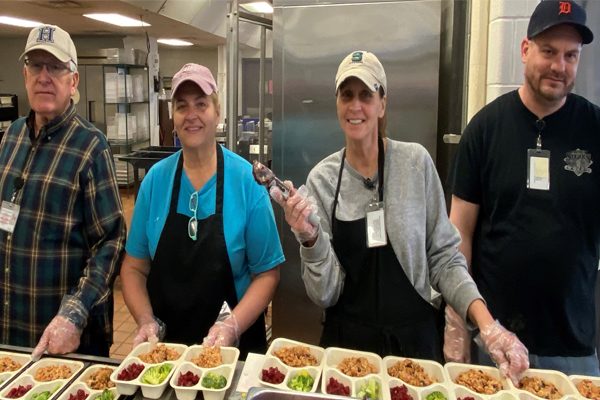The Meals on Wheels kitchen team of James Hosmer, Michelle Briston, Joyce Haire, and Ryan Bottoms prepare hundreds of meals a day.
By John Hummer
Editor
 The Jackson County Meals on Wheels program is one of those programs that many people below the age of 60 may not think too much about but should know that it helps a lot of people in the elderly population eat healthy while maintaining their independence at home. To be eligible, a person must be 60 years of age or older, or the spouse of a person 60 years of age or older, and be homebound (i.e., does not leave home under normal circumstances).
The Jackson County Meals on Wheels program is one of those programs that many people below the age of 60 may not think too much about but should know that it helps a lot of people in the elderly population eat healthy while maintaining their independence at home. To be eligible, a person must be 60 years of age or older, or the spouse of a person 60 years of age or older, and be homebound (i.e., does not leave home under normal circumstances).
“One of the areas that people cut back on is eating healthy nutrition-wise, which impacts their overall health,” stated Pequet, pictured left. “If we can help them maintain good nutrition in the home, that helps them to stay out of the hospital – it has that rolling effect of trying to keep somebody healthy, strong, and active. We target people that are home-bound, or maybe there is a caregiver in the home,” said Pequet, who has been with the department for over 25 years and became director in 2020.
Meals on Wheels is one of the largest programs in Jackson County. In 2021, the program served over 293,000 meals to over 1,300 individuals in their homes. There are 16 Meals on Wheels vans in the fleet, 14 of which are on the road at any one time while two serve as back-ups.
The program has a budget of $1,415,000 for the current fiscal year that covers everything from meals to equipment repair. The Jackson County Department on Aging receives funding that comes from the federal government via the Older Americans Act that funnels through the State of Michigan. “That’s how we get a majority of our funding for Meals on Wheels,” said Pequet.
At the user level, Meals on Wheels is a donation-based program where recipients of meals can donate to help offset their cost (suggested donation is $2.50 per meal), but it is not a requirement to have the meal service. Donations are all confidential. Seniors can get up to 14 meals per week, depending on what their needs are, in recyclable trays.
“The need is greater than what some of those grants allow,” explained Pequet regarding the funding of Meals on Wheels.
Meals on Wheels kitchen staffer James Hosmer works on packing
the meals before they are loaded for delivery.
The Soup’s on for Seniors program has raised between $15,000 to $20,000. The Friends of Jackson Seniors, who put on the event, donated a total of $27,000 in 2020 that went towards the purchase of a new Meals on Wheels van. The 2020 event took place just prior to the start of the COVID pandemic. Other years’ fundraisers have also helped purchase new Meals on Wheels vehicles. Friends of Jackson Seniors is a 501(c)3 nonprofit organization that is the fundraising arm that helps support the Department on Aging.
The senior millage that was re-approved by voters in 2020 also helps support Meals on Wheels, as well as all the Department on Aging programs. “The senior millage and donations we receive help us to meet our overall mission of helping seniors stay active and be independent in their homes by engaging them in activities to keep them healthy mentally and physically,” Pequet noted.
Beef stew, meatloaf, stewed chicken, and Tahitian chicken are just a few
samples of meals seniors receive as part of the Meals on Wheels program.
But as someone ages in place, that person may also need help in the home, and that’s where Meals on Wheels and home care services provided by the Department on Aging come into play. “Meals on Wheels is almost like a safeguard for individuals in the community that are struggling health-wise,” Pequet said. But it goes much deeper than that.
“At times, a driver may go to a home and a senior may not answer the door,” she explained. The Meals on Wheels driver will then call the DOA office who will call an emergency contact to check on the person. “Sometimes a family has gone out to a home to check on their loved one and maybe that person has taken a fall or things like that,” Pequet noted. “We’ve also gone up to a home and tried to deliver and might hear a senior yelling for help because they have taken a fall.
 Meals on Wheels driver Kurt Hasselschwert delivers a meal to a thankful senior.
Meals on Wheels driver Kurt Hasselschwert delivers a meal to a thankful senior.
“So, those meal drivers can be true lifesavers as people may need help at different times,” continued Pequet. We have a great team of drivers that really do get to know the individuals they’re delivering to. That driver might be the only person that senior might see for a couple of weeks. Our drivers see our seniors more often than the social workers that do assessments. They are the eyes and the ears of the organization.”
There is a pool of about 25 paid Meals on Wheels drivers serving 14 routes in Jackson County. Ten routes deliver Monday through Friday, while four routes deliver Monday, Wednesday, and Friday. “You want somebody that is passionate about wanting to help seniors,” Pequet said. “We get a lot of calls from seniors that are so thankful for their drivers – for just talking with them and checking on them.”
The multi-thousands of Meals on Wheels are prepared at the Crouch Senior Center’s kitchen on Lansing Avenue in Jackson by a group of six cooks. “We have a very dependable, great team of cooks to prepare the meals each day,” noted Pequet.
For more information about Jackson County Meals on Wheels program, visit www.co.jackson.mi.us/653/Meals-on-Wheels, mealsonwheels-jacksonmi.com, or call 517-788-4364.







You have unread messages (4) from Dawn! Read now: https://cutt.us/LkWKa?h=c406a34541885fc7a601b6ea39747f9a-
March 22, 2022 at 4:35 am
9v2z9a